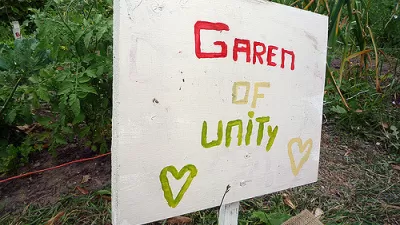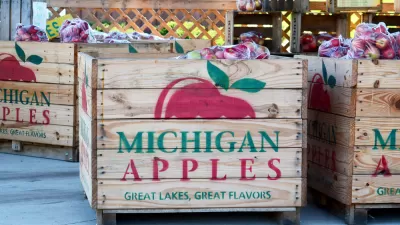By a narrow vote, Detroit's City Council has given approval for the city to sell 140 acres of vacant land to financial services business owner John Hantz for the creation of an urban agriculture project. Some are calling the deal a "land grab."

After four years of negotiations with the city, and vocal public opposition, plans by Detroit to sell 1,500 city-owned plots for $520,000 to John Hantz for the creation of his ambitious "Hantz Woodlands" project were narrowly approved by the City Council this week, reports Steve Pardo. The first phases of the project will see the demolition of structures, removal of trash, and title work (at a cost of $3.2 million) and the planting of at least 15,000 trees that "would eventually be used for commercial purposes" once the city passes an urban agriculture ordinance.
Although Mayor Dave Bing "said the project is in line with his vision of transforming vacant and underutilized parcels," Pardo notes that, "[f]oes have questioned the sale price, accused Hantz of getting special treatment and questioned the wisdom of allowing one firm to own so much land."
According to Susie Cagle, writing in Grist, the supposedly "vacant" land may not be deserted after all: "In These Times reports that about 100 people still live in the areas that Hantz plans to demolish, clean, and plant full of trees by next spring."
Despite opposition to the Hantz project, "Detroit’s community garden and urban farming scene is positively blooming, and it stands to grow even more in 2013," says Cagle. "Last week, the city’s Planning Commission approved a new zoning ordinance that would officially recognize the city’s gardens and farms, as well as create new ways forward for creating larger farms and reusing vacant buildings. The new rules would also allow for sale of the goods and produce grown. The City Council will vote on the new rules in January."
FULL STORY: 140 acres in Detroit sold to grow trees

Alabama: Trump Terminates Settlements for Black Communities Harmed By Raw Sewage
Trump deemed the landmark civil rights agreement “illegal DEI and environmental justice policy.”

Planetizen Federal Action Tracker
A weekly monitor of how Trump’s orders and actions are impacting planners and planning in America.

The 120 Year Old Tiny Home Villages That Sheltered San Francisco’s Earthquake Refugees
More than a century ago, San Francisco mobilized to house thousands of residents displaced by the 1906 earthquake. Could their strategy offer a model for the present?

In Both Crashes and Crime, Public Transportation is Far Safer than Driving
Contrary to popular assumptions, public transportation has far lower crash and crime rates than automobile travel. For safer communities, improve and encourage transit travel.

Report: Zoning Reforms Should Complement Nashville’s Ambitious Transit Plan
Without reform, restrictive zoning codes will limit the impact of the city’s planned transit expansion and could exclude some of the residents who depend on transit the most.

Judge Orders Release of Frozen IRA, IIJA Funding
The decision is a victory for environmental groups who charged that freezing funds for critical infrastructure and disaster response programs caused “real and irreparable harm” to communities.
Urban Design for Planners 1: Software Tools
This six-course series explores essential urban design concepts using open source software and equips planners with the tools they need to participate fully in the urban design process.
Planning for Universal Design
Learn the tools for implementing Universal Design in planning regulations.
Clanton & Associates, Inc.
Jessamine County Fiscal Court
Institute for Housing and Urban Development Studies (IHS)
City of Grandview
Harvard GSD Executive Education
Toledo-Lucas County Plan Commissions
Salt Lake City
NYU Wagner Graduate School of Public Service




























